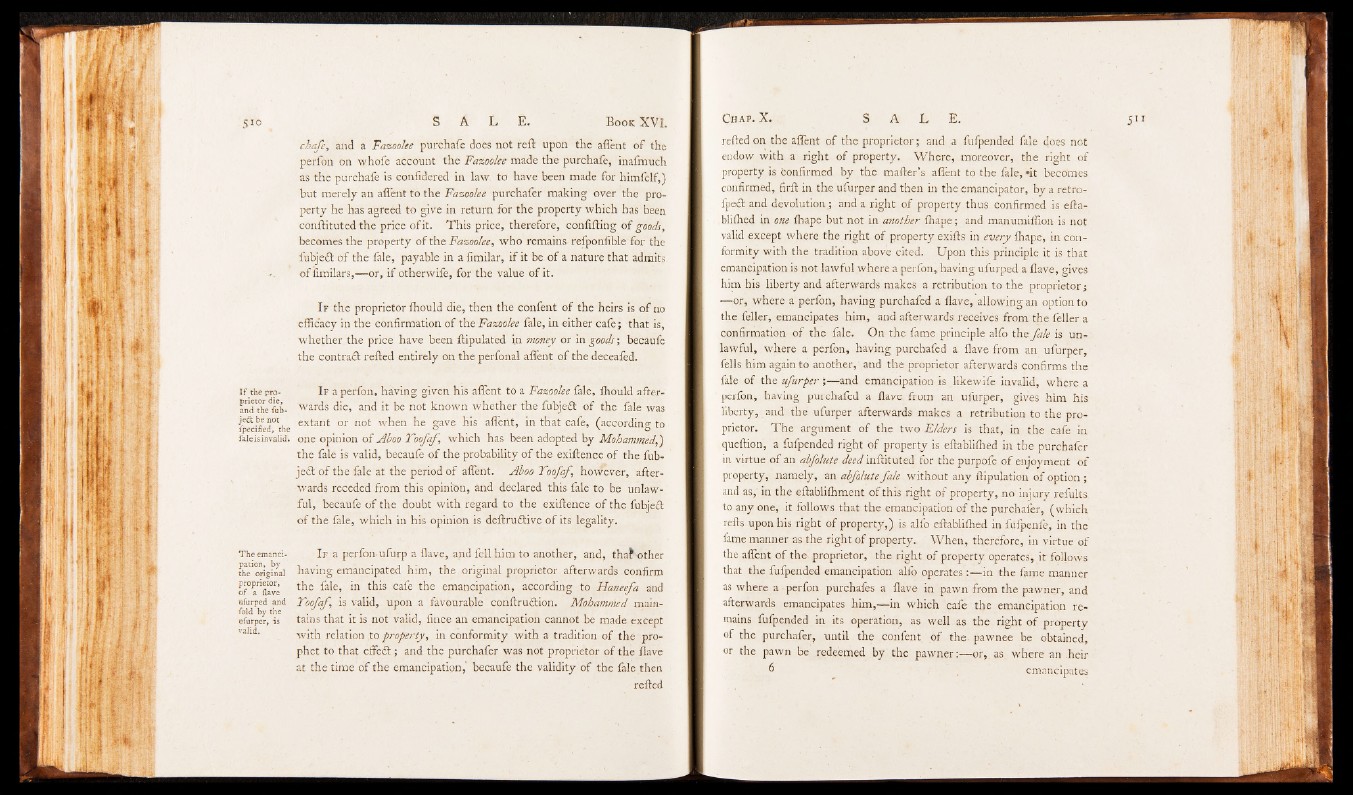
chafe, and a Fazoolee purchafe does not reft upon the affent of the
perfon on whofe account the Fazoolee made the purchafe, inafmuch
as the purchafe is confidered in law. to have been made for himfelf,)
but merely an affent to the Fazoolee purchafer making over the property
he has agreed to give in return for the property which has been
conftituted the price of it. This price, therefore, confifting of goods,
becomes the property of the Fazoolee, who remains-refponfible for the
fubject of the fale, payable in a fimilar, if it be of a nature that admits
of fimilars,— or, if otherwife, for the value of it.
If the proprietor fhould die, then the confent of the heirs is of no
efficacy in the confirmation of the Fazoolee fale, in either cafe; that is,
whether the price have been ftipulated in money or in goods; becaufe
the contract refted entirely on the perfonal affent of the deceafed.
i f the pro- If a perfon, having given his affent to a Fazoolee fale, fhould afterancTthe
fob- wards die, and it be not known whether the fu'bjëét of the fale was
j.ea.b,e“ot, extant or not when he gave his afleiit, in that cafe, (according to ipecined, the _ v o
fakisinvalid, one opinion of Ahoo Toofaf, which has been adopted by Mohammed,')
the fale is valid, becaufe of the probability of the exiftence of the fub-
je£t of the fale at the period of affent. Aboo Yoofcf, however, afterwards
receded from this opinion, and declared this fale to be unlawful,
becaufe of the doubt with regard to the exiftence of the fubjeft
of the fale, which in his opinion is deftruftive of its legality.
Theemand- If a perfon- ufurp a Have, and fell him to another, and, tha£ other
tbe'original having emancipated him, the original proprietor afterwards confirm
P™Pn?°r’ the fale, in this cafe the emancipation, according to Haneefa and
ufurped and Yoofcf, is valid, upon a favourable conftruftion. Mohammed mainfold
by the . . . v . ’ , -'
ufurper, is tains that it is not valid, lince ail emancipation cannot be made except
with relation;to property, in conformity with a tradition of the prophet
to that effedt; and the purchafer was not proprietor of the Have
at the time of the emancipation,' becaufe the validity of the fale then
refted
refted on the affent of the proprietor; and a fufpended fale does not
endow with a right of property. Where, moreover, the right of
property is confirmed by the mafter’s affent to the fale, »it becomes
confirmed, firft in the ufurper and then in the emancipator, by a retro-
fpedt and devolution ; and a right of property thus confirmed isefta-
blilhed in one \ hape but not in another ftiape; and manumillion is not
valid except where the right of property exifts in every ftiape, in conformity
with the tradition above cited. Upon this principle it is that
emancipation is not lawful where a perfon, having ufurped a Have, gives
him his liberty and afterwards makes a retribution to the proprietor;
■—or, where a perfon, having purchafed a Have, allowing an option to
the feller, emancipates him, and afterwards receives from the feller a
confirmation of the fale. On the fame principle alio the fale is unlawful,
where a perfon, having purchafed a Have from an ufurper,
fells him again to another, and the proprietor afterwards confirms the
fale of the ufurper -,— and emancipation is likewife invalid, where a
perfon, having purchafed a Have from an ufurper, gives him his
liberty, and the ufurper afterwards makes a retribution to the proprietor*;
The argument of the two Elders is that, in the cafe in
queftion, a fufpended right of property is eftablilhed in the purchafer
in virtue of an abfolute deed inftituted for the purpofe of enjoyment of
property, namely, an abfolute fale without any ftipulation of option;
and as,' in the eftablifhment of this right of property, no injury refults.
to any one, it follows that the emancipation of the purchafer, (which
refts upon his right of property,) is alfo eftablilhed in fufpenfe, in the
fame manner as the right of property. When, therefore, in virtue of
the affent of the* proprietor, the right of property operates, it follows
that the fufpended emancipation alfo operates ;— in the fame manner
as where a-perfon purchafes a Have in pawn from the pawner, and
afterwards emancipates him,— in which cafe the emancipation remains
fufpended in its operation, as well as the right of property
of the purchafer* until the confent of the- pawnee be obtained,
or the pawn be redeemed by the pawner:— or, as where an .heir
o . . - , emancipates